The Right's Snowflakes Are Banning Books
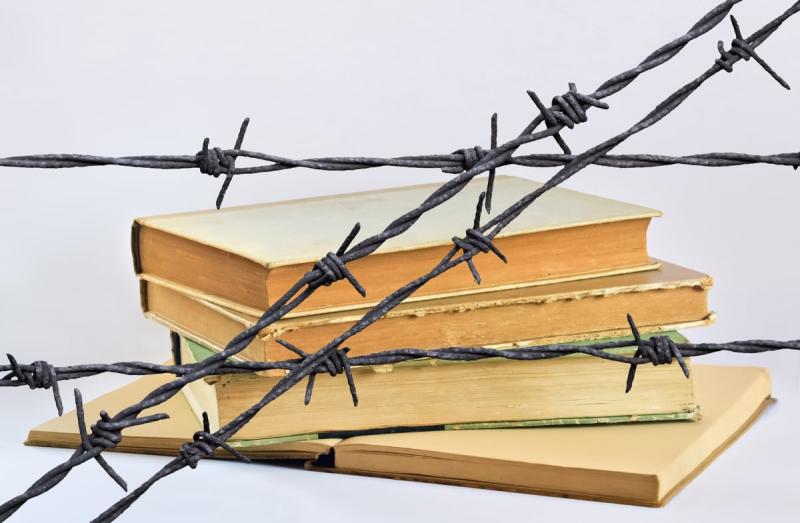


Their critique of the book "Martin Luther King, Jr. and the March on Washington" objects to references to the "blasting fire hoses" that had been turned on "children who marched, sang and prayed" during demonstrations.
Also objectionable: references to "Bull" Connor and the hateful racism that civil rights activists encountered from all-white police forces.
 |
Charlie Sykes
|
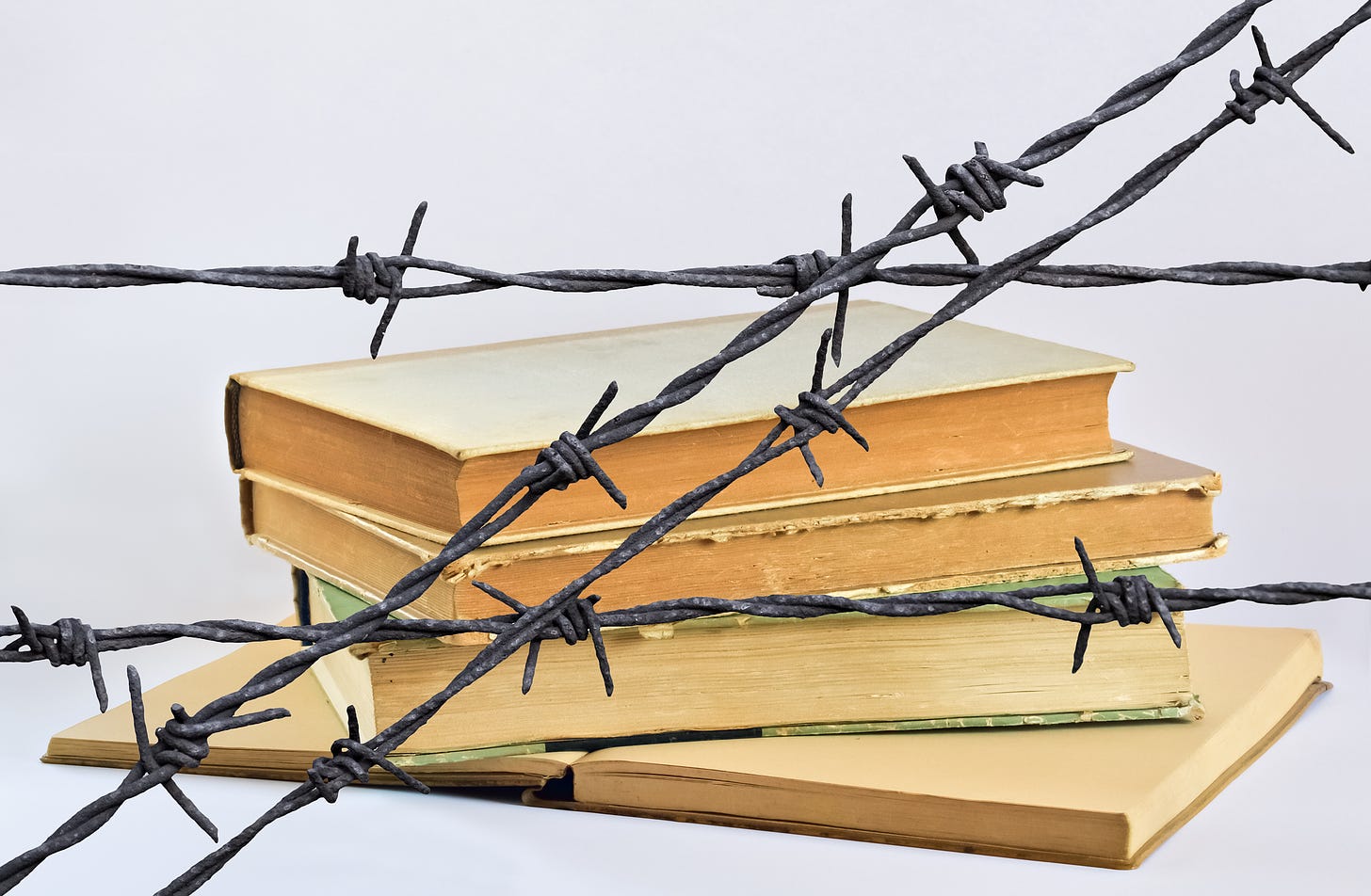
It turns out that the "f*ck your feelings" crowd actually cares very much about their own feelings.
In fact, they feel strongly enough about their feelings that they are banning books that might hurt them. So we get stories like this from Pennsylvania:
Last October, the all-White [Central York] school board unanimously banned a list of educational resources t hat included a children's book about Rosa Parks, Malala Yousafzai's autobiography and CNN's Sesame Street town hall on racism.
The good news is that the board has now backed off the book ban. But it was, nevertheless, a revealing episode. Will Bunch writes:
The mess in the Central York School District, which includes several suburban townships just north of York, in a county where Donald Trump won 62% of the vote, started after some parents and teachers had hoped to bolster the curriculum around anti-racism in the wake of the George Floyd protest marches in spring 2020. The move backfired when some parents started complaining about the reading list proposed by a committee. "I don't want my daughter growing up feeling guilty because she's white," one parent, Matt Weyant, told a recent school board meeting. Then, panicked school board members imposed "a freeze" on students using the books.
This, however, pales in comparison to what has been happening in Tennessee, where the Republican governor has signed a new law that mandates that schools cannot teach lessons that make students feel "discomfort, guilt [or] anguish" because of their race or sex.
The new law has become a flash point in the affluent Franklin district, where an activist mom named Robin Steenman has formed a "Moms for Liberty" group that is objecting to books and lesson plans— especially about the civil rights movement — that she says is "too focused on the country's segregationist past, making kids feel uncomfortable about race." Reports Reuters:
Members of Steenman's group pored over the second-grade books, marking up those they found objectionable with highlighters and sticky notes. On June 30, soon after the new law was signed, Steenman sent an 11-page letter outlining potential violations to the Tennessee Department of Education. Among the books Moms for Liberty deemed inappropriate are "Martin Luther King Jr. and the March on Washington" and "The Story of Ruby Bridges," about the Black 6-year-old who integrated a Louisiana public school in 1960.
In their critique of a book on singer Marian Anderson, for example, they wrote:

Their critique of the book "Martin Luther King, Jr. and the March on Washington" objects to references to the "blasting fire hoses" that had been turned on "children who marched, sang and prayed" during demonstrations.
Also objectionable: references to "Bull" Connor and the hateful racism that civil rights activists encountered from all-white police forces.
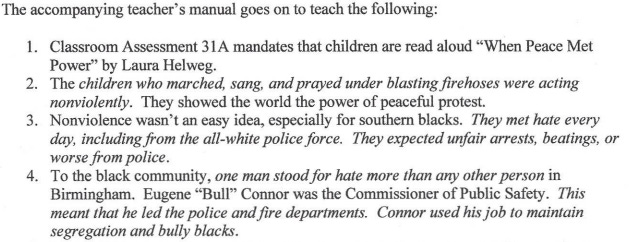
Their critique of "The Story of Ruby Ridges," objected to depictions of the angry white mob that greeted the young girl when she attempted to go to school.
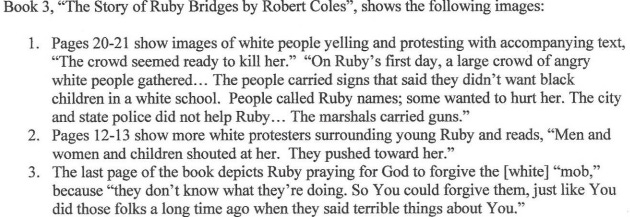
Oddly enough, Steenman's group also highlighted the account of Ruby praying for God to forgive the white mob, which the "Moms for Liberty," complained, made a "direct comparison between white people and those that crucified Jesus."

In her letter, Steenman took particular exception to the number of times the word "injustice" appears in the Teacher's Manual.

And, of course:
![]()
Steenman insisted that such lessons violated the explicit provisions of Tennessee's new law, which was passed as part of the effort to combat what critics insisted was Critical Race Theory.
In reality, though, the new attempts to ban books and micromanage discussions of race and justice, have little to do with CRT. But they do reflect the campaign to stigmatize any discussions, ideas, or narratives about that might be uncomfortable — or hurt someone's feelings.
In that sense, they are the inevitable result of the cynical strategy laid out by anti-CRT activist Christopher Rufo:
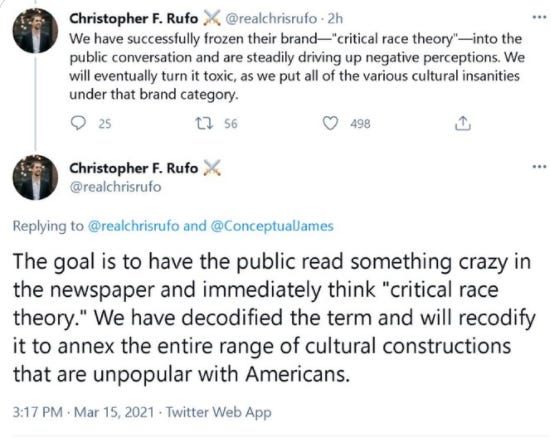
So don't expect the book bans to end anytime soon

Tags
Who is online
87 visitors

Is anyone surprised that conservatives are trying to ban simple retellings of important events in civil rights history?
Not surprised at all, they are the world biggest hypocrites.
Maybe the morons think "The Story Of Ruby Bridges " is critical race theory.
=
There are right wingers, some whom have influence over school boards, that want there to be no references at all to the civil rights movement and its struggles. They want children to believe that equal rights for racial minorities were handed down beneficently and readily, and promptly, by the white majority.
Judge J. Skelly Wright 's court order for the first day of integrated schools in New Orleans on Monday, November 14, 1960, was commemorated by Norman Rockwell in the painting, The Problem We All Live With (published in Look magazine on January 14, 1964). [10] As Bridges describes it, "Driving up I could see the crowd, but living in New Orleans, I actually thought it was Mardi Gras . There was a large crowd of people outside of the school. They were throwing things and shouting, and that sort of goes on in New Orleans at Mardi Gras ." [10] Former United States Deputy Marshal Charles Burks later recalled, "She showed a lot of courage. She never cried. She didn't whimper. She just marched along like a little soldier, and we're all very very proud of her." [11]
As soon as Bridges entered the school, white parents pulled their own children out; all the teachers except for one refused to teach while a black child was enrolled. Only one person agreed to teach Bridges and that was Barbara Henry , from Boston , Massachusetts , and for over a year Henry taught her alone, "as if she were teaching a whole class."
That first day, Bridges and her mother spent the entire day in the principal's office; the chaos of the school prevented their moving to the classroom until the second day. On the second day, however, a white student broke the boycott and entered the school when a 34-year-old Methodist minister, Lloyd Anderson Foreman, walked his five-year-old daughter Pam through the angry mob, saying, "I simply want the privilege of taking my child to school ..." A few days later, other white parents began bringing their children, and the protests began to subside. [2] [12] Yet, still, Bridges remained the only child in her class, as she would until the following year. Every morning, as Bridges walked to school, one woman would threaten to poison her, while another held up a black baby doll in a coffin; [13] because of this, the U.S. Marshals dispatched by President Eisenhower , who were overseeing her safety, allowed Bridges to eat only the food that she brought from home. [14]
Child psychiatrist Robert Coles volunteered to provide counseling to Bridges during her first year at Frantz. He met with her weekly in the Bridges home, later writing a children's book, The Story of Ruby Bridges , to acquaint other children with Bridges' story. [15] Coles donated the royalties from the sale of that book to the Ruby Bridges Foundation, to provide money for school supplies or other educational needs for impoverished New Orleans school children. [16]
The Bridges family suffered for their decision to send her to William Frantz Elementary: her father lost his job as a gas station attendant; [17] the grocery store the family shopped at would no longer let them shop there; her grandparents, who were sharecroppers in Mississippi, were turned off their land; and Abon and Lucille Bridges separated. [16] Bridges has noted that many others in the community, both black and white, showed support in a variety of ways.
Ruby Bridges - Wikipedia
The hypocrisy of it all. They call foul on the "cancel culture" until it's their agenda's cancel culture.
A very good point.